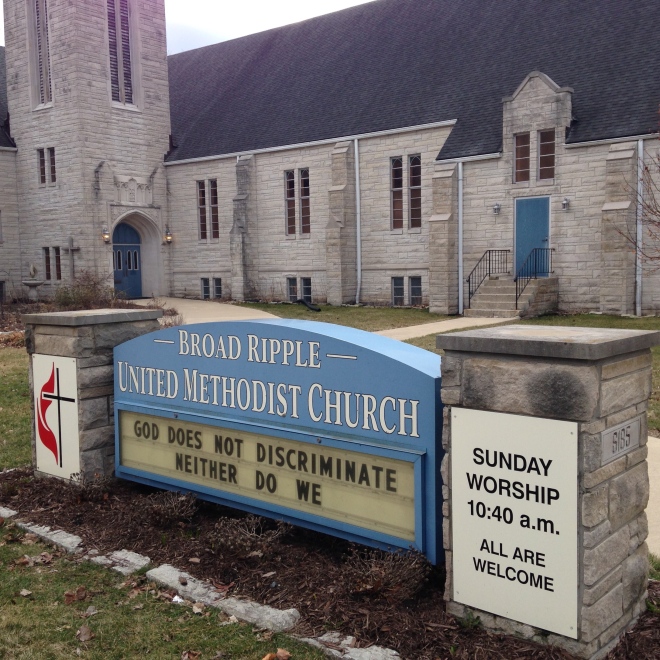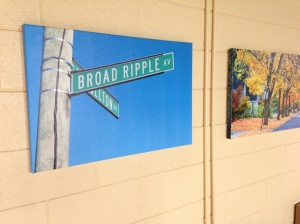This spring was a watershed moment in Indiana. The passage of the Religious Freedom Restoration Act (RFRA) was painful and damaging. At the same time, the episode revealed how much our culture has changed in a short period of time and gives me hope for continued growth.
The swift adoption and signing into law of Indiana’s RFRA was painful. It was painful to watch the law’s proponents steamroll the warnings, objections, and resistance of so much of the community as they moved their bill through the legislative process. It was painful to see many of our lawmakers revealed as either naive and short-sighted or overtly two-faced. It was painful to watch Indiana law open the door for discrimination in the name of religion. It was painful to watch my Christian brothers and sisters use their considerable political power to clear the way for overt oppression of minorities, all the while claiming oppressed minority status themselves. It was painful to watch Indiana scrutinized for backward and bigoted action on the national stage.
At the same time, the RFRA mess was a hopeful experience: there was massive outcry against such a measure, and the protest changed the outcome. In my fifteen-year experience of working for social change, I’ve grown accustomed to the feeling of beating on brick walls, especially in anti-gun and anti-war efforts. What happened in Indiana this spring turned out to be an experience of discovering that the wall of homophobia wasn’t nearly as solid as it looked, and when enough people pushed together, the wall crumbled. We discovered that the power of those who insist on civil rights progress and the dignity of all is greater than the power of those who want to return to a time of state-sanctioned discrimination buttressed by religious language.
In the end, progressive power forced a neutering of the law; no longer will it effectively roll back the anti-discrimination protections already on the books in a few places in Indiana. Nevertheless, discrimination on the basis of sexual orientation or gender identity remains legal in most of the state.
Now we face an important question as a state-wide community: what next in the wake of the RFRA mess?
We can take a lesson from the natural world around us. Where there were barren branches and empty fields, there are now leaves and crops beginning to grow. Life is springing forth again, transforming the landscape that seemed so dead just a few weeks ago. Blossoms and flowers shout new life, and lush grass is back in our yards. Brown and gray gave birth to green and yellow and purple and orange.
This season in our Hoosier life, like spring, is a moment for resilience. But let’s be careful about what we mean by resilience. Resilience can refer to a resistance to change, like in materials science. When stretched, resilient materials like the steel of a spring don’t transform, they bounce back to their original shape.
For those who understand vibrant life as progress on a journey, resilience doesn’t end with the ability to bounce back, to heal a wound and return to the previous status quo. Resilience is choosing to grow in response to challenge, to advance in response to a setback. Resilience creates a new status quo. A resilient person, or community, responds to a painful episode by leaning into the pain and welcoming the stretch. Resilient communities see struggle as a crucible in which the next degree of purification takes place. Resilient cultures recognize the opportunity for breakthrough in the midst of breakdown.
This is a season for that kind of resilience in Indiana. The voice of regression spoke loudly, and nearly carried the day. In the end, the voice of progress neutralized the regressive impulse at the legislative level. But what happens in our legislature is only one expression of who we are as a Hoosier people. What comes next in hundreds of local communities will make all the difference; will we settle back into old prejudices and allow familiar ideological boundaries to divide us? Or will we seize this moment as the perfect time to be stretched into a new shape?
If we want to grow through this experience, we need one another. The ability to withstand the pain of growth is formed in supportive community. Resilience’s strength comes from the web of human connection. The web of relationships formed by reaching out exactly when the voice inside is saying “Keep to yourself! It’s not safe out there!” is the birthplace of resilience. If we want our communities to be resilient, we need to build ever-expanding webs of connection, to know one another, especially across ideological boundaries. In our polarizing era, we need to be willing to lean into one another, take the risk of uncomfortable differences in perspective, and look for and celebrating commonalities. When we really listen to one another at our kids’ schools and soccer games, at the coffee shop and café, in our neighborhoods and on the trails, we weave webs that provide the strength we need to grow. We learn to see the hearts of gold underneath whatever it is we see on the surface that divides us. We learn to have true compassion for our fellow travelers, even in the midst of serious disagreements.
When we don’t know one another, it’s easy to believe the worst about the Other. We settle for the caricature offered up in the echo chamber of our friends, unchallenged by personal experience with ‘those people.’
When we know one another’s stories, we can have compassion for their blind spots. When we understand what inspires our neighbors, we can see their motivation and understand their passion. When a wide range of community members see themselves as partners in tending our common life, united by values like, say, Hoosier Hospitality, or a vision like equality of opportunity for all, there’s room for vigorous debate within the wide confines of mutual respect. Our democracy can thrive without so easily descending into the muck of gloves-off name-calling politics.
It’s a new season in Indiana both in the natural world and in our human community. Nature’s resilience is on display. May we have the courage to make it a season for deepening our community resilience by deepening our connections to one another, especially across all-too-familiar boundaries.
This piece was written for publication in the May-June edition of Branches magazine, the theme of which was resilience. Branches is published in Indianapolis, distributed free around Indiana, and can be found in libraries, health food stores, and various other venues.




